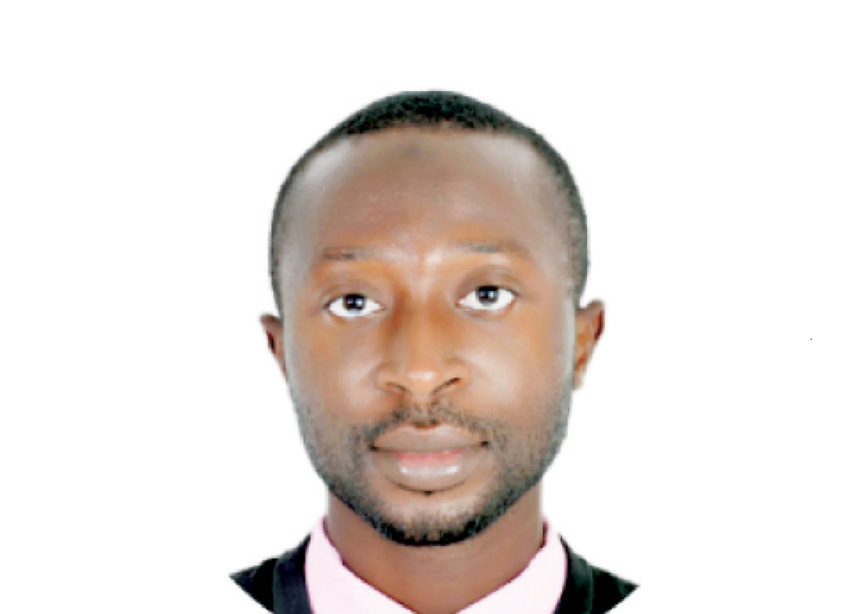Muhammad Kabir Musa is a pharmacist, a second-year PhD student, and a graduate student instructor at the University of Michigan College of Pharmacy in the United States. A Rackham Fellow, his research centres on implementing precision pharmacogenomic testing in community oncology settings in the US. In this interview by KINGSLEY ALUMONA, he speaks about his research endeavours and the Nigerian healthcare system.
You have transitioned from hospital pharmacy practice in Nigeria to research spanning Africa, Central Asia, and now North America. Looking back, what personal or professional experiences most shaped your commitment to improving global health outcomes?
Reflecting on my journey from working in a hospital pharmacy in Nigeria to conducting research across Africa, Central Asia, and now North America, several personal and professional experiences have profoundly shaped my commitment to improving global health outcomes.
My interest in health and well-being began early in life. Growing up in my community, Okuta, (Senrukperu) in the Baruten Local Government Area of Kwara State, I was naturally curious about health. This curiosity became deeply personal during my first year of secondary school at Baptist Grammar School, Okuta, in Kwara state, when I was diagnosed with chronic typhoid fever. I spent several weeks in the hospital, and because of the severity of my illness, I could only communicate with my doctor through writing. Even after I left the hospital, I continued to rely on traditional medicine for a full recovery. Witnessing the importance of traditional medicine in my community and seeing many residents travel to neighbouring countries for care had a profound impact on me, inspiring me to pursue a healthcare career.
Fast forward, after secondary school, I was privileged to be accepted into the Pharmacy programme at Usmanu Danfodiyo University, Sokoto, Nigeria, where I graduated in 2017. My passion for research was sparked during my final year thesis project in the Department of Pharmacology under the mentorship of Professor Abubakar Kabiru. Our work, which was published in the Australian Journal of Science and Technology, evaluated the Anxiolytic and antidepressant effects of methanol stem bark extract of Bombax buonopozense P. Beauv. (Bombacaceae). This project strengthened my skills in rigorous scientific inquiry and deepened my passion for solving problems in the healthcare field.
Upon graduation, as required by the Pharmacy Council of Nigeria, I was mandated to complete a one-year compulsory internship as part of the qualification process for the pre-licensure examination, which I must pass to become registered as a pharmacist in Nigeria. I completed this internship at Ahmadu Bello University Teaching Hospital (ABUTH), where I had the opportunity to learn clinical skills from the clinicians (pharmacists, physicians, nurses, and others), and also had close interaction with patients. All of these experiences taught me that our healthcare system needs further improvements, and research plays a crucial role in making a difference.
After completing my internship at ABUTH, I proceeded to serve for the National Youth Service Corps (NYSC). I was posted to the General Hospital in Hunkuyi, Kaduna State, by the Kaduna State Ministry of Health and Human Services after completing my NYSC camp. Here, I also had the opportunity to engage with patients across primary and secondary healthcare systems. Engaging directly with community members gave me practical insights into healthcare gaps and reinforced my commitment to pursue sustainable, evidence-based solutions.
ALSO READ: Tinubu not pressuring me to do wrong thing — NNPC’s Ojulari
At the same time, I enrolled in a master’s programme at Ahmadu Bello University in Zaria, Nigeria, but had to leave due to the COVID-19 pandemic and labour disputes that led to the university’s closure. In 2022, I was awarded a competitive, fully funded master’s scholarship to study Public Health (MPH) at the top-ranked (number one) in Kazakhstan at Nazarbayev University in Astana, which I completed in June 2024. Before finishing the MPH programme, in February 2024, I had already received a prestigious PhD fellowship to study Clinical Pharmacy Translational Science at the University of Michigan in Ann Arbor, United States, an honour awarded to the top one per cent of applicants globally.
Finally, all of these experiences, from surviving a serious childhood illness and witnessing the value of traditional medicine to engaging in academic research and working in clinical practice, have fueled my passion for improving health systems. Whether working locally or internationally, my goal remains the same: To lead and contribute innovative solutions that improve healthcare access, quality, and policy, ultimately resulting in better global outcomes.
Are you on a scholarship in the US? If yes, tell us the story.
Yes, I am currently on a scholarship in the US, which I earned through a very highly competitive process. Out of thousands of applicants, only thirteen candidates made it to the first round of selection. We then had a month to prepare for an intensive, eight-hour conference-style interview. During the interview, all applicants introduced themselves, and I was asked to go first, giving me a valuable opportunity to present my background and research interests. After the introductions, we moved into breakout rooms where I presented my previous research to a panel of faculty members. I also met with faculty members individually to present to them, and had the chance to interact with a graduate student representative.
In February 2024, I received my admission offer along with the Rackham Fellowship, and I continue to receive funding for my studies through my college of pharmacy and Rackham Graduate School. This scholarship has been crucial in supporting my academic journey in the US.
Your pioneering work on chronopharmaceutical drug delivery for hypertension offered both clinical and economic insights for Nigeria and beyond. How do you see such innovations reshaping healthcare in resource-limited settings?
Globally, over one billion people suffer from hypertension, which is a chronic condition that usually requires lifelong medication to control blood pressure. Since blood pressure naturally fluctuates with the body’s biological clock, I saw an opportunity to use chronopharmaceutical technology, which delivers drugs in sync with an individual’s circadian rhythms. This approach can significantly improve hypertension management.
Therefore, developing personalised antihypertensive drug delivery systems that match patients’ circadian rhythms offers great potential for resource-limited settings. By optimising medication timing, these methods can increase adherence, reduce side effects, and improve health outcomes. This is especially important in areas with limited healthcare access, as even small decreases in hospitalisations or complications can provide significant financial relief for families and overtaxed healthcare systems. Such improvements can help prevent unnecessary costs and deaths caused by hypertension-related problems worldwide.
My review paper on chronopharmaceutical drug delivery systems highlights the potential of these time-dependent therapies, particularly in resource-limited settings. Based on my work, I can say that when our medications are designed to align with the biological clock, we can decrease hospitalisation rates by as much as 20 per cent in Nigeria. We know that in most hospitals in Nigeria, a single cardiovascular admission can cost between ₦50,000 and ₦200,000 on average, which is a lot for the average Nigerian. This approach can prevent thousands of complications each year and save the healthcare system millions of naira. From a global perspective, a 10 per cent decrease in hypertension-related hospitalisations can result in savings of billions of dollars annually in healthcare costs.
Therefore, chronopharmaceutical strategies provide a patient-centred, cost-effective, and sustainable approach to managing hypertension beyond Nigeria. This technology would help our healthcare systems maximise their limited resources and enhance access to essential treatments.
During the COVID-19 pandemic, your nanotechnology research highlighted affordable and scalable solutions for diagnostics and protective equipment. In hindsight, what lessons from that period should guide future global health responses?
Hindsight from my research on the COVID-19 pandemic revealed the critical need for affordable and scalable medical devices that can support early and accurate diagnosis in future pandemics, thereby saving lives and reducing economic impact. My work demonstrates that nanotechnology, including nanosensors for accurate early detection and nanoscale fibres, can enhance personal protective equipment (PPE), offer significant medical and economic benefits by improving detection and reducing disease transmission.
Additionally, a key insight from my work is that nanomedicine provides a versatile technology capable of delivering both drug-based and non-pharmacological treatments. During the early stages of the COVID-19 pandemic, multiple vaccines were in development, along with some clinical trials. We highlighted in our paper that nanomedicine-based delivery systems offer the opportunity to deliver vaccines or agents that target the virus’s genetic material, a finding validated by previous work showing that tiny drug agents can penetrate the virus’s cell membrane. So, this approach can enhance treatment effectiveness and improve patient outcomes.
Furthermore, in my opinion, widespread adoption of nanosensor diagnostics and advanced nanofibre PPE presents an opportunity to reduce COVID-19 transmission and hospitalisations by 15–20 per cent. This reduction can result in substantial economic savings. For example, at the outset of the pandemic, Nigeria initially estimated pandemic response costs to be over US$330 million (approximately ₦250 billion). In addition, even a 10 per cent reduction in hospitalisations through better diagnostics and PPE can save tens of millions of dollars, freeing up resources for other urgent health priorities.
Moving forward, these lessons demonstrate that investing in innovative, cost-effective technologies, such as nanotechnology, can significantly enhance global health responses, particularly in resource-limited settings, by reducing disease transmission, alleviating healthcare burdens, and ultimately saving lives.
At Ahmadu Bello University Teaching Hospital, your study on handwritten prescription errors provided concrete evidence for adopting electronic prescribing systems. How do you think digital health innovations can be scaled in low- and middle-income countries to improve patient safety?
Scaling digital health innovations in low- and middle-income countries (LMICs) to enhance patient safety will require addressing several key factors. My experience at Ahmadu Bello University Teaching Hospital, where we are conducting a study on prescription legibility in line with the World Health Organisation guidelines. Our study found an error rate of approximately 38 per cent in handwritten prescriptions, and we recommended clearly demonstrating the need to adopt electronic prescribing, as it can significantly reduce these mistakes.
Also, electronic prescriptions can enhance communication between physicians and pharmacists, improve patient safety, simplify medication management for patients and caregivers, and facilitate the quick reconciliation of drug-related concerns, ultimately leading to better patient outcomes. On the policy level, what does this intervention mean? For example, based on my conservative estimate, I believe that adopting digital prescriptions can reduce errors by approximately 60 per cent, preventing around 2,280 errors per 10,000 prescriptions. This improvement can save lives each year and prevent many patients from serious medication-related harm.
Also, the financial implications will be significant. For example, previous studies show that the downstream costs of an adverse drug event in Nigeria range from ₦50,000 to ₦150,000 per case. Preventing these errors can result in healthcare savings between $75,000 and $225,000 per 10,000 prescriptions at prevailing exchange rates (approximately ₦1,535 ≈ $1 USD).
Therefore, to effectively scale digital health innovations, reliable infrastructure, including electricity, internet connectivity, and affordable hardware, must be established. Additionally, digital tools should be customised to fit local clinical workflows, patient and provider needs, and be user-friendly, while also considering healthcare system capacities to ensure usability and relevance. Therefore, building capacity by training healthcare workers and pharmacists in digital literacy and system operation is crucial for the adoption and long-term success of these solutions.
Additionally, supportive policies, regulations, and data protection frameworks will be essential for building trust and ensuring compliance among the providers. Moreover, funding models that involve partnerships with international organisations, donors, and the private sector can help subsidise costs and increase access for the public and private facilities. Implementing electronic prescribing in our healthcare systems will improve communication between prescribers and pharmacists, enhance clarity, reduce errors, and ultimately guarantee patient safety. The good news is that ABUTH now has electronic prescribing integrated into its clinical workflow, presenting an opportunity for health systems across Nigeria to adopt it. Additionally, for health systems in the global South, however, resources remain critical.
You are now advancing precision medicine through your PhD research on pharmacogenomics in oncology care in the United States. Having achieved so much across continents, what is the next chapter for you? Where do you see your work and impact heading in the coming years?
The next phase of my work will focus on expanding the reach and impact of precision medicine, especially pharmacogenomic testing, in real-world clinical settings across the US. Drawing from my experience on three continents, I aim to close the gaps between research, clinical practice, and policy to ensure that personalised cancer treatments, such as DPYD testing, are broadly adopted and accessible, particularly in the community oncology setting in the United States, where most patients receive care.
My doctoral work at the University of Michigan, Ann Arbor, Michigan, USA, is of national importance because previous studies have shown that approximately 335,000 patients in the United States receive fluoropyrimidine-based chemotherapy and oral capecitabine each year. Therefore, my work can save hundreds of lives annually by reducing severe treatment-related toxicities. Additionally, the financial benefit is significant because preventing adverse drug reactions can save millions of dollars in healthcare costs, including hospital readmissions, treatment of drug-related side effects, and lost economic productivity.
Beyond the US, I see my work contributing to the global advancement of precision oncology by promoting equitable access to pharmacogenomic testing across diverse healthcare systems worldwide. Since over two million cancer patients (with solid tumours such as breast, colorectal, bladder, head, and neck cancers) receive these medications globally, integrating DPYD pharmacogenomic testing into routine cancer care and influencing health policy can help reduce preventable toxicities and improve survival rates for thousands of patients. This also has the potential to generate significant economic savings. Ultimately, I aim to transform oncology care both nationally and internationally, ensuring that innovative, personalised treatments become the standard of care everywhere.
WATCH TOP VIDEOS FROM NIGERIAN TRIBUNE TV
- Let’s Talk About SELF-AWARENESS
- Is Your Confidence Mistaken for Pride? Let’s talk about it
- Is Etiquette About Perfection…Or Just Not Being Rude?
- Top Psychologist Reveal 3 Signs You’re Struggling With Imposter Syndrome
- Do You Pick Up Work-Related Calls at Midnight or Never? Let’s Talk About Boundaries







